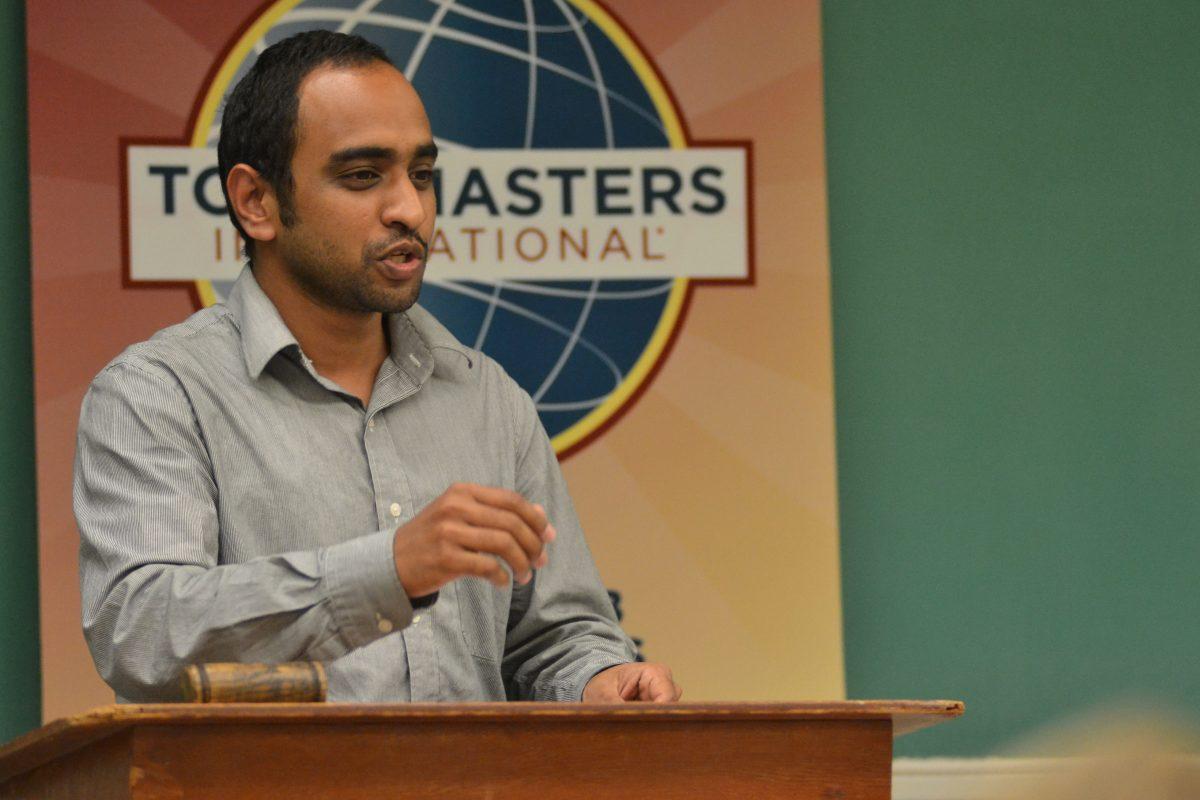Public speaking is an art as much as it is a tool for George Vincent, a 29-year-old graduate student in industrial engineering.
N.C. State’s chapter of Toastmasters, the world’s largest public speaking forum, houses students, faculty and others from around the world looking to improve their public speaking skills—their gains often exceed these skills.
“In my case [Toastmasters] transfers into my student life and my social life,” Vincent said. “It isn’t just about public speaking, it’s about the confidence you get from public speaking.”
Vincent, a native of India who recently moved to Raleigh for graduate school, won the state-level Toastmasters competition, and will be competing in the Toastmasters Worldwide Competition for Public Speaking in Cincinnati this August.
Vincent, an English speaker most of his life, is among a variety of foreign and American-born citizens who attend weekly Toastmasters meetings. Some join to improve their English, others join to gain work-related skills and others simply want to learn how to tell a good story.
Tigran Mirzoev, an alumnus and member of Toastmasters, was born and raised in Uzbekistan, where mainly Russian was spoken. Mirzoev said he heard about Toastmasters from a co-worker after receiving his masters from N.C. State.
“I wish I would have joined when I was at N.C. State,” Mirzoev said.
Angkana Bode, club treasurer of toastmasters and facilities architect at N.C. State, said she originally joined Toastmasters in 2003 while working at UNC–Chapel Hill. She continued through N.C. State’s chapter of Toastmasters in 2009 when she became a facilities operator at the University.
Bode said her decade-long relationship with Toastmasters has improved her English and her confidence.
“At this club when you go up to talk people pay attention, they look at you, they hear you and they want to understand you and cheer you on,” Bode said.
After 10 years of attending meetings, Bode said she doesn’t think she will ever leave Toastmasters.
“I believe I will be a Toastmaster for life,” Bode said. “It is such a wonderful and giving environment where we support each other.”
Vincent, who said he will likely be the president of N.C. State’s chapter next year, began attending Toastmasters meetings in India in 2008. His employer, an information technology company in India, suggested joining Toastmasters to hone his communication skills.
“I just went to a session out of curiosity and I liked the way it was conducted,” Vincent said. “I joined and I’ve been a member for about four years now.”
Since then he placed third in the Toastmasters regional competition for Southern India in 2012, before winning the North Carolina regional this year.
Vincent has had no trouble communicating with others since he moved to North Carolina. He attributes this partially to Toastmasters.
“It did help me that I was a Toastmaster because I was a better communicator and a better reader,” Vincent said. “It made me more confident when I was communicating with [North Carolinians].”
Competitions run somewhat like Toastmasters meetings. A speaker presents a story—typically a personal anecdote or informative tale—of their choice while the speaker is judged and timed. All speeches are met with applause from fellow Toastmasters.
The difference between meetings and competitions is that competition has winners and losers, and meetings are for personal improvement.
“It is about taking a speech and fine tuning it over and over again,” Vincent said. “[The competition] is basically a contest where you can speak about any subject for seven minutes.”
The subjects of speeches at either venue are up to the speakers—save the “table topics” section of meetings where randomly selected members go up to talk about any subject on the spot.
When preparing a story, Toastmasters speakers keep in mind how to connect with the audience.
“I like speaking about subjects that inspire and motivate the audience,” Vincent said. “You cannot connect with the audience unless you have a personal story.”
Vincent’s current story for competition involves a failure he experienced while in school in India.
“The message was simple—never giving up,” Vincent said.
Ted Feitshans, professor in agricultural and resource economics, was a founding member of the club in 1989. He said the N.C. State chapter was originally founded for the University’s extension faculty, who presented and communicated with people around the state.
“[The] goal when founding it was for us all to become better speakers, and I think that’s happened,” Feitshans said.
Although the demographic of the group has shifted the past 25 years, its focus has only strengthened, according to Feitshans.
The skills Toastmasters provides for participants transfer beyond presenting a story, according to Vincent, who said Toastmasters has made him more confident in his studies, work and social interaction.
“Toastmasters isn’t just about communication, it’s about leadership,” Vincent said.
And public speaking doesn’t come easy for most people, even those who mustered the courage for their first Toastmasters meeting.
“Most people aren’t natural speakers,” Vincent said.
Toastmasters is screening SPEAK, a documentary about the art of public speaking and the Toastmasters World Championship of Public Speaking at the D.H. Hill auditorium on Saturday June 22 at 1:30 p.m. The screening is open to the public.








